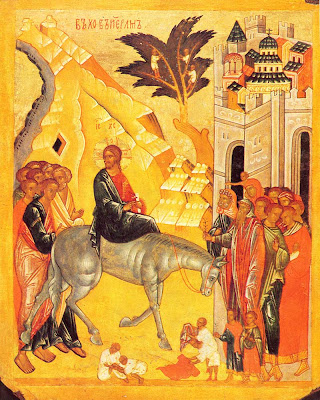Children prevent the stones from having to cry out
The four gospels often describe the same episode in slightly different ways: a good example is the entry of Our Lord into Jerusalem. The analysis of these differences is called "redaction criticism" in scripture studies, focussing on the distinct contributions of the different authors.
What is not studied so much is the way in which the texts of the sacred liturgy often give us a ready-made reconciliation of the gospels. In the case of the traditional sung texts, this composite picture is an important source in itself. In the sung texts of the traditional Roman rite, the first part of today's Palm Sunday liturgy gives greater emphasis to the children than we might otherwise take from a reading of the gospel texts themselves. Particular weight is given to the mention of children in St Matthew's gospel:
And the chief priests and scribes, seeing the wonderful things that he did, and the children crying in the temple, and saying: Hosanna to the son of David; were moved with indignation. And said to him: Hearest thou what these say? And Jesus said to them: Yea, have you never read: Out of the mouth of infants and of sucklings thou hast perfected praise? (Matt 21.15-16)In the spirit of the liturgical emphasis on the Pueri Hebraeorum (the Hebrew children with whom we begin the procession) I like to associate the children with the declaration of Our Lord (in response to the demand of the Pharisees that Our Lord should rebuke His disciples):
"I tell you, if these were silent, the very stones would cry out" (Lk 19.40)Our Lord comes into His own domain (in propria venit) and His own people do not accept Him. In accord with the eternal plan or economy of God, He comes as the crowning glory of all creation, Himself having taken on a human nature while being the living God in person. Jerusalem, the focus of the worship demanded by the law given by the Most High, is above all His domain. It would be blasphemy by omission if He were not to be acknowledged as the triumphant King of all creation, the one who brings peace and salvation.
The children in their innocence acclaim Him. The liturgical emphasis on the children teaches us that their freedom from sin makes them able to give Him praise in simplicity of heart. Thanks to them, the stones could continue to remain silent until they split apart in protest at the outrage of His crucifixion.
As a parish priest, I could not help but point out this morning that this entry of Christ into Jerusalem teaches us something about children in Church. They are not merely tolerated, they are essential. In simple biological terms, if we have a Church without children we are only waiting until the last one out turns the lights off; but in theological terms too, children offer in their innocence a level of worship to the Father which we have to recover ("unless you be converted and become as little children...")
Thanks be to God we had many children this morning both for the modern rite and for the (long) traditional rite - the latter was every bit a "Children's Mass." During the (40 minute) singing of the Passion I noticed one or two giggles at the synagoger tone. I took a Pope-Francis-style extempore moment to explain in my sermon that the different chants in the Passion told us who was Jesus and who were the "baddies."

